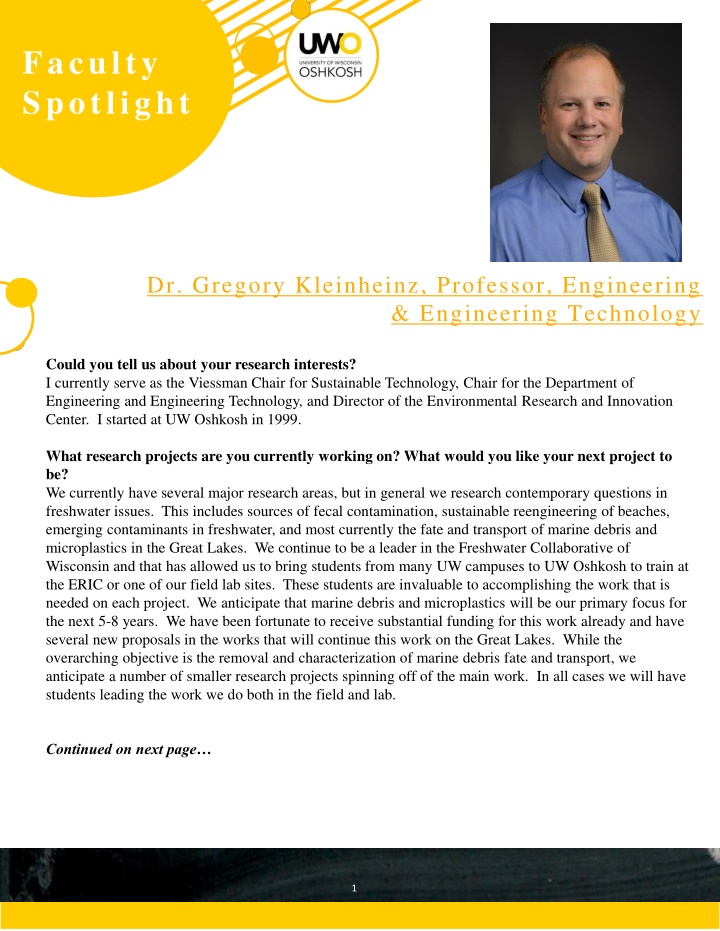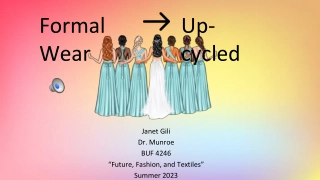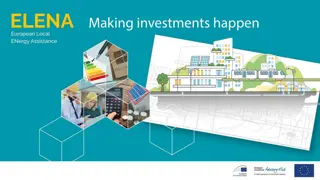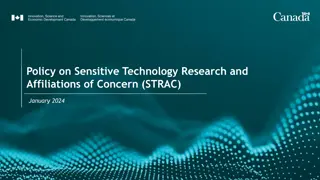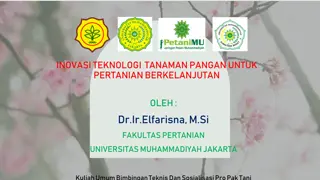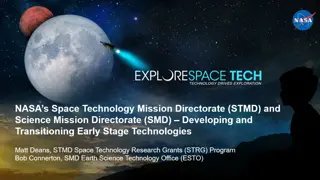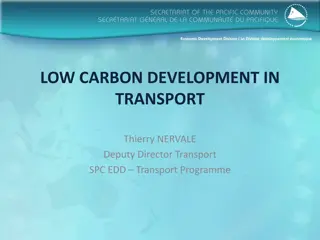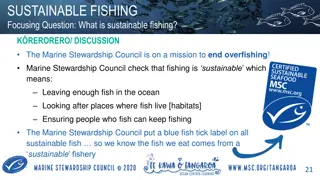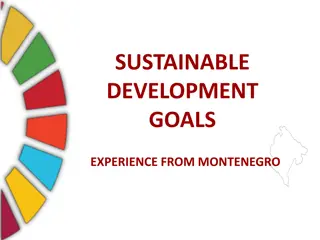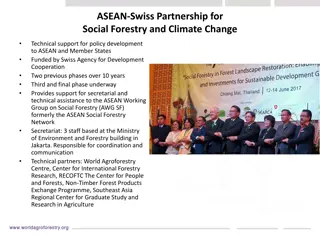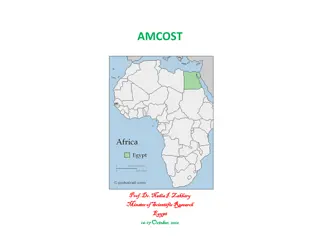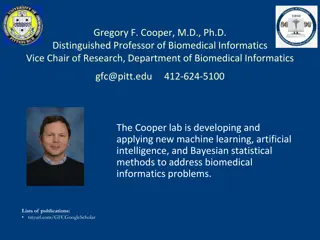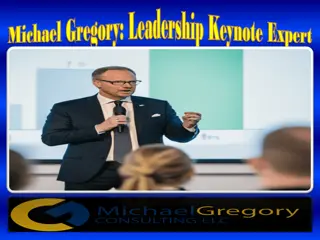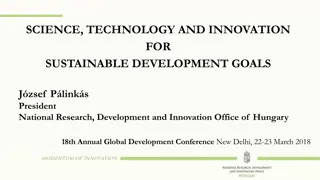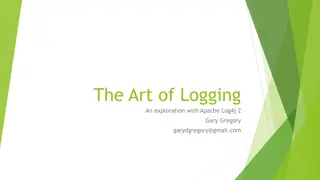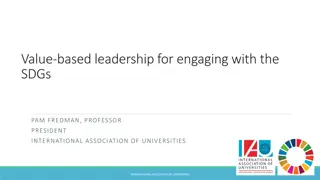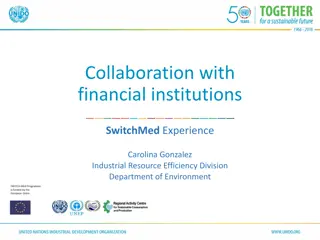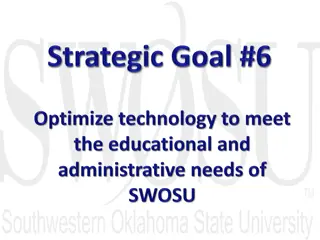Dr. Gregory Kleinheinz - Sustainable Technology Research Focus
Dr. Gregory Kleinheinz, a Professor in Engineering & Engineering Technology at UW Oshkosh, leads research on freshwater issues, focusing on marine debris and microplastics in the Great Lakes. He discusses challenges in academia and emphasizes diversifying funding sources for research sustainability.
Download Presentation

Please find below an Image/Link to download the presentation.
The content on the website is provided AS IS for your information and personal use only. It may not be sold, licensed, or shared on other websites without obtaining consent from the author.If you encounter any issues during the download, it is possible that the publisher has removed the file from their server.
You are allowed to download the files provided on this website for personal or commercial use, subject to the condition that they are used lawfully. All files are the property of their respective owners.
The content on the website is provided AS IS for your information and personal use only. It may not be sold, licensed, or shared on other websites without obtaining consent from the author.
E N D
Presentation Transcript
Faculty Spotlight Dr. Gregory Kleinheinz, Professor, Engineering & Engineering Technology Could you tell us about your research interests? I currently serve as the Viessman Chair for Sustainable Technology, Chair for the Department of Engineering and Engineering Technology, and Director of the Environmental Research and Innovation Center. I started at UW Oshkosh in 1999. What research projects are you currently working on? What would you like your next project to be? We currently have several major research areas, but in general we research contemporary questions in freshwater issues. This includes sources of fecal contamination, sustainable reengineering of beaches, emerging contaminants in freshwater, and most currently the fate and transport of marine debris and microplastics in the Great Lakes. We continue to be a leader in the Freshwater Collaborative of Wisconsin and that has allowed us to bring students from many UW campuses to UW Oshkosh to train at the ERIC or one of our field lab sites. These students are invaluable to accomplishing the work that is needed on each project. We anticipate that marine debris and microplastics will be our primary focus for the next 5-8 years. We have been fortunate to receive substantial funding for this work already and have several new proposals in the works that will continue this work on the Great Lakes. While the overarching objective is the removal and characterization of marine debris fate and transport, we anticipate a number of smaller research projects spinning off of the main work. In all cases we will have students leading the work we do both in the field and lab. Continued on next page 1
Faculty Spotlight Dr. Gregory Kleinheinz, Professor, Engineering & Engineering Technology Continued from previous page What challenges have you faced in your career to date? What have you learned from those experiences? There is always a cycle of support that exists in higher education. This depends on the others you may need to work with outside your research but are required to accomplish your research within the confines of the university. Within this cycle you will have times of great support and other times with minimal support. My advice is to learn the systems and procedures that are needed to conduct your research 'business'. Understand why things work a certain way. By being more independent and understanding the why behind the processes and systems we use you can get them to work for you in times with minimal institutional support. While it can be frustrating that these efforts are not directly doing the research you are passionate about, they are part of managing a research program and/or project. If you can save time and energy on these activities, you will have more for the research itself. Can you hare your experiences applying and receiving extramural funding? My philosophy on applying for extramural funding is to be open to many sources of funding and diversify your funding sources. By doing this you are able to build a sustainable and continuously funded research program at UW Oshkosh. I believe that you need to swing for the fences at times, but there is also 'low hanging fruit' that will fund your research with a higher probability of funding success. Develop a strategy to incorporate all of these sources into your funding portfolio. Make sure you understand the RFP and adapt your work or pitch to the RFP, do not expect the funding agency to adapt to your work. In my time at UW Oshkosh, I have received over $20 million in extramural funds from private corporations, the State of WI, US EPA, USDA, NOAA, Sea Grant, and many others. This funding has allowed for a steady program that has involved over 600 undergraduates and 30 graduate students, coming from over 25 colleges and universities. Continued on next page 2
Faculty Spotlight Dr. Gregory Kleinheinz, Professor, Engineering & Engineering Technology Continued from previous page What advice would you give other UW Oshkosh faculty applying for grants? Seek out those that have been successful and learn what they have done to be successful. I did this in my first two years after my PhD when I was a Research Assistant Professor at Michigan Tech University. The advice those faculty provided was invaluable in building my professional approach to research and extramural funding. Incorporate aspects of these winning strategies into one that is unique to you and your work. Don't reinvent the wheel, learn from those of us that have made mistakes and struggled. When you do not succeed once, get back up and learn from that experience. We do not succeed by being knocked down. We succeed by getting back up and trying again. Finally, when you become successful stay true to your core values. Others may look at your success and think you are lucky or feel you do not need any support because you are successful. They will not realize all the sleepless nights, many extra hours of hard work, and the stress that it takes for you to succeed. Take a moment to reflect, enjoy the success, and be the best 'professional you' that you can. 3
Faculty Spotlight Dr. Samantha Larson, Assistant Professor, Public Administration Could you tell us about your research interests? I have come to identify myself as a social equity scholar. I apply that lens within public policy and program implementation, evaluation, and analysis. But more specifically, I examine how the field of policy and public administration can better understand and advance social equity, belonging, democracy, community resilience, and healing. I ve looked at these topics both theoretically and practically in areas such as public transit, public health, emergency management, and higher education. What research projects are you currently working on? What would you like your next project to be? I have several research projects in the works, but three stand out at the moment. First, I m leading a study to assess the social vulnerability, disaster resilience, and adaptive capacities of 14 counties in East Central Wisconsin, which is funded by the Sustainability Institute for Regional Transformations and Faculty Development. Second, I m a co-principal investigator on an ADVANCE grant aimed at enhancing equity and inclusion in STEM departments at UWO while also mitigating the systemic factors that create inequities in the academic profession, which is funded by the National Science Foundation. And third, I m a co-principal investigator on a research initiative that will provide a roadmap for recruiting, training, and managing a modern public sector workforce in Wisconsin, which is funded by the Tommy G. Thompson Center on Public Leadership. What challenges have you faced in your career to date? What have you learned from those experiences? Finding the right balance between scholarship, teaching, and service has been an ongoing challenge for me. It takes a lot of time and focus for me to reach a state where I can dive into my research and churn out anything meaningful. That s hard to do when teaching three to four classes per semester. One strategy I ve learned is to seek the intersection point between those three areas of the job. For instance, I try to conduct collaborative research with students by building it into my classes. One example of this is the study on social vulnerability and resilience in emergency management planning, which was informed by analyses my Master of Public Administration students performed in a special topics course I developed in the fall of Continued on next page 4
Faculty Spotlight Dr. Samantha Larson, Assistant Professor, Public Administration Continued from previous page 2021. Students gained analytical skills and I have been able to utilize those preliminary results as a starting point for future research projects. I love to look for crossover opportunities like that. Can your share your experiences applying for and receiving extramural funding? Since coming to UWO in 2017, I ve applied for several extramural research grants. However, most of my successes have come in the last year, including the three grant-funded projects previously mentioned. I think I can largely attribute that to two things. First, I received a course release through my position as Deputy Director of the Whitburn Center for Governance and Policy Research in 2021-2022. Part of my responsibilities for the Center include grant writing. It takes a lot of time and effort to do it well. Applications require a lot of attention to detail, and a strong mix of hard data and qualitative stories that demonstrate need for and importance of a project. Second, collaboration with other faculty, staff, and students is also a key factor. Partnering with other folks that bring their own areas of expertise to a project is really important as well. And many funders are looking for interdisciplinary teams and those that are looking to have an impact beyond the literature itself, but on a practical level. What advice would you give other UW Oshkosh faculty applying for grants? Before becoming an academic, I worked in the nonprofit world, cultivating relationships between private foundations and nonprofit grant seekers in rural Colorado. Through conversations with funders, I learned that it is important to apply(even if you don t feel 100% ready to do so). The same rule applies for research grants. You ll never know if you don t apply. And that is also how you get to know the people working at the funding agency, get constructive feedback (even if you don t get funded), and apply that feedback to improve your proposal the next time. Many people groan at the thought of applying for grants, but I have come to love the process. It s all about continuously building mutually beneficial relationships. Again, it s also important to remember that grant seeking, writing, management, and evaluation takes a lot of dedicated time. When we don t get funded, it can be easy to get discouraged. So, I encourage folks to look up the percentage of applications that get funded in order to have realistic expectations of success. 5
